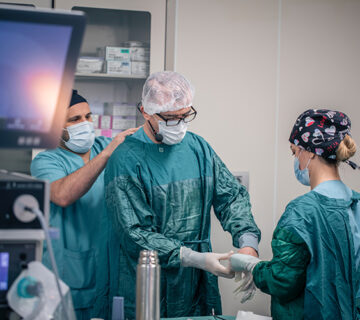Introduction
The medical tourism industry has experienced significant growth over the past few decades, driven by advances in medical technology, communication, and travel. Technology plays a crucial role in improving the quality, accessibility, and efficiency of healthcare services, making medical tourism more attractive to international patients. In this article, we will explore how technology is transforming the medical tourism industry and enhancing the overall experience for both patients and healthcare providers.
1.Telemedicine and Remote Consultations
One of the key technological innovations in the medical tourism industry is telemedicine. Telemedicine allows patients to consult with healthcare providers remotely, reducing the need for initial in-person visits. This is especially useful for international patients who may need to discuss their medical concerns or get a second opinion before traveling abroad for treatment.
Tip: Many medical tourism providers now offer telemedicine services as part of their package, allowing patients to have consultations with doctors before, during, and after their treatment.
Example: A patient in the United States may consult with a doctor in India via video call to discuss the details of a surgery, ask questions about the procedure, and receive a treatment plan before making the decision to travel.
2.Online Platforms for Booking Medical Services
The rise of online platforms has made it easier for patients to book medical treatments abroad. Websites and apps dedicated to medical tourism offer a centralized platform where patients can search for accredited hospitals, compare treatment prices, read reviews, and schedule appointments. This streamlines the process of selecting a healthcare provider and booking medical services.
Tip: Utilize trusted medical tourism websites that offer detailed information about healthcare providers, patient reviews, and treatment costs. These platforms make it easier to compare options and find the best destination for your medical needs.
Example: Websites like HealthTourism.com and Medical Departures allow patients to browse hospitals in different countries, read reviews from other patients, and directly book appointments.
3.Electronic Health Records (EHR) and Data Sharing
With the increasing globalization of healthcare, the ability to share electronic health records (EHR) across borders is becoming more important. EHRs allow patients to share their medical history and treatment details with healthcare providers worldwide, ensuring continuity of care and reducing the risk of medical errors. This is especially beneficial for medical tourists who require follow-up care after returning home.
Tip: Make sure your medical provider offers EHR systems that allow for seamless sharing of your medical data with specialists abroad. This will ensure that your treatment is well-documented and any necessary follow-up can be easily coordinated.
Example: A patient undergoing heart surgery in Mexico can share their electronic health records with their primary care physician back home in the U.S., ensuring that the follow-up treatment is coordinated and well-informed.
4.Robotic Surgery and Minimally Invasive Techniques
Robotic surgery and minimally invasive procedures are revolutionizing the field of medical tourism by offering patients advanced treatment options with shorter recovery times. Robotic-assisted surgeries, for example, allow surgeons to perform precise operations with minimal incisions, leading to quicker recovery, less pain, and lower risks of complications.
Many countries that are popular for medical tourism, such as South Korea and India, have incorporated advanced technologies like robotic surgery into their medical practices, attracting patients who seek cutting-edge treatments with faster recovery times.
Tip: Look for destinations and hospitals that offer the latest advancements in robotic surgery and minimally invasive procedures for faster recovery and better outcomes.
Example: In countries like South Korea and India, robotic surgery is used for various procedures, including prostate surgery, spinal surgery, and colorectal surgery, providing patients with less pain and faster healing times.
5.Medical Tourism Apps and Virtual Assistance
As the medical tourism industry continues to grow, many companies have developed mobile applications and virtual assistance services to help patients navigate their medical travel experience. These apps provide a wide range of services, from helping patients book flights and accommodations to offering real-time translations and medical updates.
These apps enhance the patient experience by providing quick access to essential information, eliminating the stress of organizing travel and treatment arrangements.
Tip: Before traveling, download a medical tourism app that can assist you with everything from booking your treatment to finding local healthcare providers and getting real-time updates on your treatment status.
Example: Apps like “Medigo” and “Bookimed” allow users to search for medical providers, read patient reviews, book consultations, and receive real-time notifications about their medical appointments.
6.Artificial Intelligence (AI) in Diagnostics and Treatment Planning
Artificial intelligence (AI) is playing an increasingly significant role in medical tourism by enhancing diagnostic accuracy and treatment planning. AI algorithms are being used to analyze medical images, predict treatment outcomes, and help doctors make better decisions in real-time. This helps ensure that patients receive the best possible care, especially in complex medical cases.
Tip: Choose destinations that are at the forefront of AI advancements in healthcare, as this can lead to more precise diagnoses and treatment plans tailored to your specific needs.
Example: AI technology is being used in destinations like Singapore and South Korea to analyze medical images and create personalized treatment plans, improving the chances of successful outcomes for patients undergoing complex procedures.
7.Enhanced Travel and Accommodation Services
Technology is also transforming the travel and accommodation side of medical tourism. Many medical tourism companies now offer end-to-end services, including arranging flights, booking hotels, and providing transportation to and from medical facilities. These services make the entire medical tourism experience more convenient and comfortable for patients.
Tip: Opt for a medical tourism provider that offers all-inclusive packages, covering everything from travel arrangements to accommodation and post-treatment care.
Example: Medical tourism agencies like “Patient Travel” offer packages that include not only medical treatment but also the booking of flights, hotels, and transportation, ensuring that patients have a seamless experience.
8.Wearable Technology for Post-Treatment Monitoring
Wearable health technology is increasingly being used to monitor patients after they return home from their medical treatment abroad. Devices like smartwatches and fitness trackers can track vital signs, monitor recovery progress, and provide real-time feedback to healthcare providers.
These wearables help patients stay connected to their healthcare team and ensure that they receive timely interventions if any issues arise during their recovery process.
Tip: Ask your medical provider if they offer post-treatment monitoring through wearable technology to ensure a smooth recovery and receive remote consultations if necessary.
Example: After undergoing surgery in India, a patient may be asked to wear a smartwatch that tracks their heart rate, sleep patterns, and physical activity levels, providing their doctor with important information during the recovery process.
Conclusion
Technology is playing a transformative role in the medical tourism industry by improving the quality of care, enhancing patient experiences, and making medical travel more accessible and efficient. From telemedicine and AI diagnostics to robotic surgery and wearable technology, these innovations are making it easier for patients to receive high-quality medical treatment abroad while enjoying greater convenience and better outcomes. As technology continues to advance, the future of medical tourism looks even more promising for patients seeking affordable, high-quality healthcare.




No comment